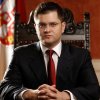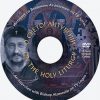Throughout his five years as Foreign Minister, Mr. Jeremić was actively engaged in the work of the United Nations, representing his country at key sessions of the General Assembly and the Security Council. He led the Serbian delegation at high-level segments of the United Nations Human Rights Council (2008, 2010 and 2011), at the annual General Conference of the United Nations Education, Scientific and Cultural Organization (UNESCO) and at high-level meetings of the United Nations Alliance of Civilizations.
Mr. Jeremić also represented Serbia at the Fourth United Nations Conference on the Least Developed Countries (Istanbul, 2011), the United Nations HighLevel Meeting on Nuclear Security (New York, 2011) and the 2010 Review Conference of the Parties to the Treaty on Non-Proliferation of Nuclear Weapons (New York, 2010).
.Elsewhere, Mr. Jeremić led his country’s delegation at high-level meetings of the African Union, the Organization of American States and the Non-Aligned Movement. In September 2011, he hosted a commemorative observance at the ministerial level for the fiftieth anniversary of the Non-Aligned Movement, in Belgrade.
During his term as Foreign Minister, Mr. Jeremić was actively involved with deliberations of the Organization for Security and Co-operation in Europe (OSCE), participating in meetings of its Ministerial Council; informal meetings of OSCE foreign ministers (Almaty, Kazakhstan, 2010 and Corfu, Greece, 2009); and in the eleventh OSCE Summit that took place in Astana, Kazakhstan (2010).
In 2011 and 2012, Mr. Jeremić presided over a number of regional organizations of South-East Europe, including the Central European Initiative, the Adriatic Ionian Initiative and the Southeast Europe Cooperation Process. In this capacity, he addressed several special sessions of the OSCE Permanent Council in Vienna. During this period, Mr. Jeremić also served as head of the Migration, Asylum and Refugees Regional Initiative and the Black Sea Economic Cooperation Organization.
Earlier, Mr. Jeremić chaired the Council of Europe’s Committee of Ministers (May to November 2007), representing the Committee before the Council’s Parliamentary Assembly. From 2008 to 2012, he headed his country’s delegation to all ministerial sessions of the Committee and addressed three sessions of the Council’s Forum for the Future of Democracy, in Sweden (2007), Armenia (2010) and Cyprus (2011).
In 2010 and 2011, Mr. Jeremić played a leading role in convening two groundbreaking conferences of foreign ministers, aimed at resolving the plight of refugees uprooted by the 1991-1995 crisis in the Western Balkans.
Mr. Jeremić began his career in public service as Adviser to the Minister of Telecommunications of the Federal Republic of Yugoslavia, in the year 2000. In June 2003, he was appointed Adviser for Foreign Affairs to the Minister of Defence of the State Union of Serbia and Montenegro, and in February 2004, he was appointed Chairman of the Foreign Affairs Committee of the Democratic Party. Later that year, in July 2004, he became Senior Foreign Policy Adviser to the President of the Republic of Serbia, continuing in this capacity until taking up the position of Foreign Minister in May 2007.
Before entering the political sphere, Mr. Jeremić worked for a number of financial institutions in London, including Deutsche Bank and Dresdner Kleinwort Benson, as well as for AstraZeneca Pharmaceuticals.
Mr. Jeremić has lectured at major universities around the world, and participated in debates and discussions convened by think tanks and organizations focusing on global issues, including the Economist magazine, World Economic Forum, Chatham House, the Bled Strategic Forum, the Aspen Institute and the MEDays Forum of the Amadeus Institute. His opinion pieces have been published in major newspapers including The New York Times, International Herald Tribune and The Wall Street Journal.
Fluent in English, in addition to his native Serbian, Mr. Jeremić holds a Bachelor of Science degree in theoretical physics from Cambridge University (United Kingdom) and a Masters in Public Administration from Harvard University’s John F. Kennedy School of Government (United States).
Mr. Jeremić was born in Belgrade in 1975, and is married to Nataša Jeremić. An avid tennis fan, he is currently president of the Serbian Tennis Federation.
Source: United Nations web-site
Links:





